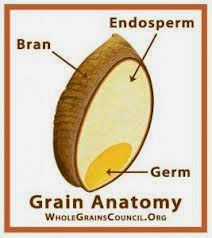Knowing the difference between whole grain, multigrain, and refined grains is an important step in making sure your diet consists of healthy complex carbohydrates to give you long-lasting energy.
Whole grains are healthier for you than processed and refined grains because they are a complex carbohydrates rather than a simple sugar, helping you to control blood sugar, reduce cholesterol and maintain a healthy weight. Consuming whole grains may help reduce the risk of heart disease and certain cancers, as well as help with weight management. Whole grains contain all parts of the grain kernel – the bran, germ and endosperm, which provide B vitamins, folate, iron, fiber and other minerals. B vitamins play a key role in metabolism and energy release, folate helps form red blood cells, and iron is used to carry oxygen in the blood. Whole grains also contain magnesium and selenium. Magnesium helps bone development as well as muscle contraction and selenium helps with oxidative stress and inflammation.
Multigrain products contain a mix of grains, such as wheat, oats, barley or cornmeal, although none of them may necessarily be whole grains. The grains may have been processed or refined, therefore reducing the nutritional value. The refining process removes the bran and germ from the grain, making it less rich in helpful vitamins and minerals. Products may be “enriched,” but it doesn't make up for the natural parts of the grain.
Examples of healthy whole grains include: whole –wheat flour or pasta, oatmeal, rolled oats, whole cornmeal, brown or wild rice, quinoa, bulgur, buckwheat and even popcorn. Look for products that list the first ingredients as “whole” vs "enriched".
USDA states on their website that "foods that are labeled with the words "multi-grain", "stone-ground", "100% wheat", "cracked wheat", "seven-grain or "bran" are usually not whole grain products".
To help get you started with some whole grain goodness here is a recipe for cold quinoa salad
COLD QUINOA SALAD
Servings: 4
Ingredients:
1 cup cooked quinoa
1/2 a yellow or red pepper diced
1/2 a yellow or red pepper diced
1 cup of cherry tomatoes cut in half
1 cup diced cucumber
1/2 cup diced black olives
1/2 cup fat free feta cheese
1/4 cup of fresh basil
2 Tbsp olive oil
4 Tbsp of lemon juice
Salt and pepper per preference
1/4 cup Diced scallions
Directions
Place the first 8 ingredients in a large bowel and mix
Add oil, lemon, salt and pepper to the mix
Serve and enjoy with a garnish of scallions
For more recipes go to http://www.choosemyplate.gov/healthy-eating-tips/sample-menus-recipes.html
Bon Apetit!

















